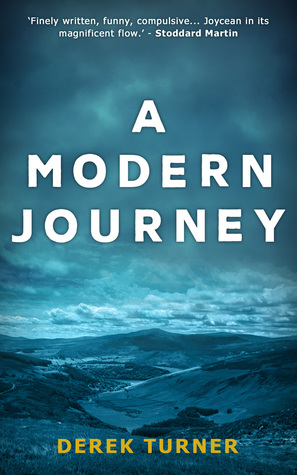In his latest novel, Derek Turner, author of Sea Changes and Displacement, takes his readers on a seriocomic journey with a latter-day Holy Fool. Along the way, Turner takes aim at the insanity of political correctness, celebrity culture in the Age of Twitter, and the spiritual wasteland that results from a denial of truth. A Modern Journey’s characters and themes bring to mind Flannery O’Connor’s half-mad prophets seeking redemption, as well as the lost soul of Walker Percy’s The Moviegoer, pining for validation through proximity to media celebrity, a kind of dubious reality accessible to modern nihilism. Turner’s protagonist is reminiscent of Chance the gardener of Jerzy Kosinski’s Being There, an idiot mistaken for a genius. Nevertheless, A Modern Journey’s readers may be left wondering whether the leading character, by all appearances an eccentric ne’er-do-well at best, a madman and faux visionary at worst, has been able, precisely because of his eccentricity and naiveté, to perceive something beyond the shallow society he lives in.
Ambrose Sheehy-O’Connor, a Dubliner, is mocked, hated, and rejected by some, and elevated to the status of prophet and saint by others. Such is the spiritual longing of Turner’s characters, an ensemble that includes Ambrose’s painfully conformist mother, Fidelma; Mary, a nun who is Ambrose’s aunt; a jaded priest wondering what might have been; a celebrity socialite living in genteel poverty; a marginal would-be counterrevolutionary; a onetime schoolmate of Ambrose’s, now a cubicle drone of the managerial economy; Irish Travelers who proclaim Ambrose a miraculous healer; and a young woman who, having previously rejected Ambrose, gravitates toward him as he becomes a media celebrity. Turner’s characters are comic and grotesque, foolish and gullible, idealistic and cynical, and touchingly human.
Ambrose himself is a loser, a skinny, unprepossessing reject bullied by his classmates at school. Jobless, he lives with his mother. Absorbed in computer games, Ambrose is a solitary figure, cruelly mocked by the object of his desire, Philomena. On a stormy night, after a particularly humiliating encounter with Philomena and her friends, Ambrose climbs to the top of a promontory marked by a gigantic cross and has a vision. Transformed by the experience, the exact nature of which is unclear, Ambrose comically adopts stilted speech (“I must needs brook no delay . . . ”) and the dress, look, and habits of a religious ascetic. He fasts and goes about creating his new religion, an absurd mishmash of computer games (“Level 3” is the Ambrosian religion’s Hell), unfocused spiritualism, and medieval Christianity.
Naturally, our hero starts a blog (“Ambrosenet”) that becomes his platform for proclaiming what he calls “the Great Renewal.” He taps into a “childish yearning for the Truth” among an audience numbed by postmodern ennui, especially after he practices his own version of mortification of the flesh by publicly driving a drill bit through his forearm, an act that is duly validated by a video that “goes viral” (trending on Twitter at #maddrillman). Ambrose is thereby certified in the eyes of viewers longing for “authenticity” as well as titillation. An alleged miraculous healing cements Ambrose’s status as an object of veneration or, alternately, of mockery and ridicule.
Ambrose plays out his role as Holy Fool in hilarious appearances on TV talk-show screamfests. The newly minted online celebrity faces off against an obnoxious TV host (who takes Ambrose to task for voting against “equal marriage,” thus implying that “gays/LGBT/trigender/transqueer/cis*males are inferior”), “Daddy Jimmy” (the Irish Church’s “Apostle to the youth” and the author of Wicked Faith, a book whose cover depicts Jesus in hip-hop/pop-star regalia), several Muslim mullahs (one of whom has “fully assimilated into Irish culture by developing a secret drinking habit”), and one luminary whom Ambrose moons on air, thus transforming the blogger-cum-spiritual healer into an Irish reality-TV star.
Bosco Buggy, an activist with dreams of the IRA’s glory days dancing in his head, contacts Ambrose and arranges for the new celebrity to call for a national rally on Easter Sunday, a day Bosco hopes he can use to spark his counterrevolution (“the Day We Saved Ireland”). The novel’s denouement is funny, moving, and tragic. Suffice it to say that Ambrose, like Carson McCuller’s deaf mute, John Singer, becomes the imagined embodiment of the wants and desires, aspirations and longings, and fears and hatreds of the other characters and the society they represent: a stand-in Christ figure for people who long for faith and redemption, as well as for those who “would hurt, or even kill, to extirpate anything that . . . hinted of any kind of Authority.”
Derek Turner has established himself as a writer worthy of serious readers’ attention. We can only look forward to his next book.
[A Modern Journey, by Derek Turner (London: Endeavour Press) 282 pp. $7.99]

Leave a Reply